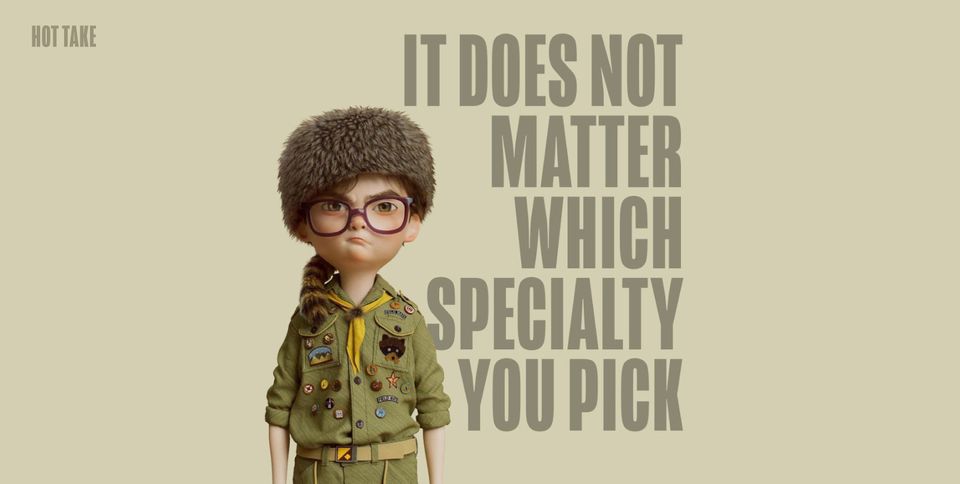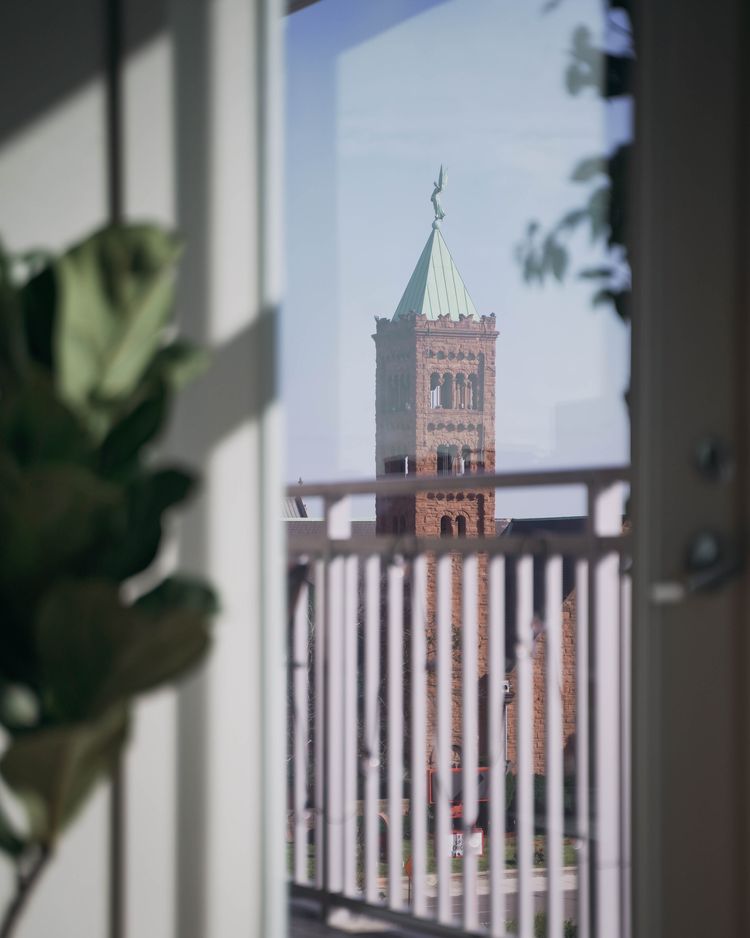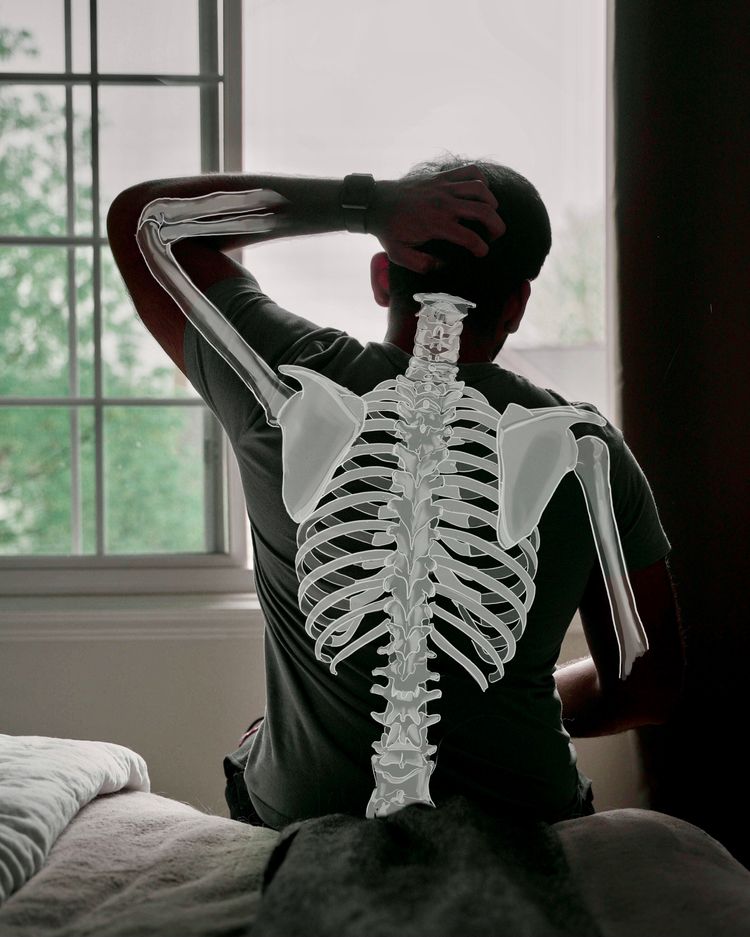Hot Take: It Does Not Matter Which Specialty You Pick

Okay, I know this is a bold claim, but I have an explanation.
Don't get me wrong, I think that it's important to do things you're passionate about. But, I think we place too much weight on finding ✨the perfect specialty✨. After all, we have spent most of our 20s working towards it, haven't we?
For me, it's like working all week and wanting to go watch a movie at the end. That movie now has so much to live up to. Even if it was a decently good movie...it's not. In a subtle way, it's a lot like the specialty we choose too. There's just too much riding on it.
I'm reading this book called So Good They Can't Ignore You by Cal Newport, and in it he references a study by a Michigan psychologist on finding passion in your work.
Click here to read about it:
The study is by Amy Wrzesniewski, a psychologist from the University of Michigan, called Jobs, Careers, and Callings: People’s Relations to Their Work.
She talked about how there are three distinct categories of work:
1) Jobs: What you do for money
2) Careers: What you do to get increasingly better work
3) Callings: What you do to as a vital part of your core identity.
Her hypothesis was that jobs like Medicine or Teaching are more likely to see people that view it as a "calling" vs. less flashy occupations which are likely to see a greater distrubition of people calling them "jobs".
To test her hypothesis, she compared the breakdown of these three categories in a career like administrative assistants. She assumed that because it's a mundane job, a majority would view it as a job, rather than a calling.
To her surprise, there was a fairly even distribution of people, similar to the flashier jobs like Medicine or Teaching. Now this was interesting.
When looking at the specifics, she noticed that the individuals who worked in the career the longest were more likely to view their job as a calling than newer employees.
This would mean that passion was not solely a result of intrinsic motivation, but might be correlated to other factors such as expertise or duration as well.
More specifically, I think a key take-away was:
Passion is a side effect of mastery.
There is a Ted Talk by Dan Pink as a continuation of this idea.
In the TED Talk (briliant btw, you should watch it), Dan talks about how people who enjoy their careers and feel gratified by them, cite three distinct qualities that the job has:
1) Competence: The feeling that you're good at what you do.
2) Autonomy: The feeling that you have control over your day/tasks.
3) Relatedness: The feeling that you are connected with others.
Now you might be wondering, how does this relate to the specialty you choose?
Let me explain.
Say you are very passionate about Psychiatry. You came into Medical School because you wanted to be a Psychiatrist. You have done lots of research, shaddowed every Psychiatrist you know, etc. If you couldn't become a Psychiatrist, you would quit Medicine today.
While you may believe that you will love being a Psychitatris, it's not that simple. I believe the reason you will/won't like that specialty – in practice – depends heavily on if you check off those three qualities:
❌ 1) If you don't feel like you're a good Psychiatrist, you won't enjoy it.
❌ 2) If you don't have autonomy over your day, or you have to do things you don't want to (i.e. fighting with insurance), you won't enjoy it.
❌ 3) If you don't feel connected to others, you won't enjoy it.
If we understand this idea, then we can then use it to find passion in anything right? Lets see.
Lets say this same person instead decided last minute to do Emergency Medicine, and now they're worried they might be making the wrong choice. After all, they once believed that Psychiatry was the only thing that would bring them joy.
Here's my evidence for why I think they aren't making the wrong choice.
The Evidence:
With time, they will get good at your job. Regardless of what job it is, if they put effort into it, they will get better, so:
✅ (1) Competence: The feeling that they are good at what you do.
With time/effort they will build career capital, which allows them to have:
✅ (2) Autonomy: The feeling that they have control over your day/ what you do.
(i.e. a great surgeon is given more vacation days because the hospital doesn't want to lose them)
And the last one would be their ability to interact with people and feel connected.
I believe that this is independent of the specialty. Although there are certain stereotypes in specialties (i.e. Orthobros and their gym regimen 🏋️), I personally believe you can find people to connect with in any specialty.
✅ (3) Relatedness: The feeling that you are connected with others.
The Take Away:
I'm not trying to say that the specialty you choose doesn't matter at all.
You should absolutely not pick one that you hate. But if you're in between two, three or even four specialties: It does not matter which you choose.
In the long run, your individual happiness or feeling of "passion" is less reliant on you choosing the right specialty, and more on what you can make of it.
Ultimately, finding fulfillment in your career is likely to be a result of the effort you put into it, rather than the specific specialty you choose.
If you've read this far, thank you. And as always, I appreciate you. 🤎





Comments ()